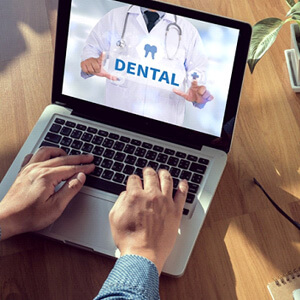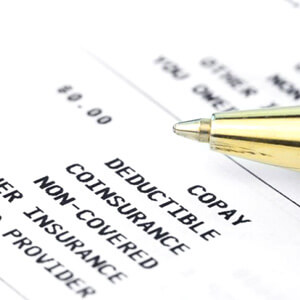Sleep Apnea Treatment – Falmouth, ME
Enjoy Uninterrupted Sleep Again

You go to bed at the same time every night to make sure you’re getting your recommended 7 to 9 hours of sleep. Despite this, you frequently find that you’re unusually tired the next day. Why aren’t you feeling as rested as you should? Oftentimes, it may be due to sleep apnea – a potentially dangerous sleep disorder that, fortunately, our team at Falmouth Dentistry can help with in many cases. Schedule a consultation for sleep apnea treatment in Falmouth with Dr. Chadbourne today by calling our dental office.
Why Choose Falmouth Dentistry for Sleep Apnea Treatment?
- Various Options for Oral Appliances
- High-Quality Dental Care
- Patient-Centered Experience
What Is Sleep Apnea?

Sometimes, you might experience pauses in your breathing while you’re asleep. If these pauses occur more than 5 times in a single hour and last more than 10 seconds each, then you have what’s known as sleep apnea. Each pause in breathing can cause your body to partially wake up. The frequent interruptions of your slumber are why you may feel unusually exhausted the following day. The cause of sleep apnea can vary, although it’s most commonly the result of the airway being blocked by collapsed tissues in your throat.
The Dangers of Untreated Sleep Apnea

In the short term, the drowsiness associated with sleep apnea can increase your risk of accidents while driving. As for the long term, if you don’t have your sleep apnea treated, you may find yourself suffering from high blood pressure, rapid weight gain, depression, and memory problems. You could even be more likely to have a potentially deadly heart attack or a stroke. In short, sleep apnea is a very serious threat to your well-being, and you should never take it lightly.
Sleep Apnea Treatment Options

Sleep apnea treatment can only begin once the disorder has been diagnosed. We can make whatever arrangements are needed to help you have a sleep test performed at home. An expert will look over the results of your test and decide whether you are likely to have sleep apnea based on your heart rate, your breathing patterns, and several other factors.
Treating sleep apnea usually involves a CPAP machine, but you also have the option of wearing an oral appliance provided by a dentist. An oral appliance can help hold your tongue in place and move your jaw forward to prevent airway obstructions that can result in sleep apnea episodes.
There are different brands of sleep apnea appliances, such as Somnomed Flex, Somnomed Avant, Prosomnus Evo, Herbst, Oasys, and Suad. When you visit our office, we can go over what makes each appliance unique and narrow down the one that you should get based on your needs.
If you’re interested in learning more about sleep apnea treatment and how Dr. Chadbourne can help, visit her sleep apnea website for additional help.
Understanding the Cost of Sleep Apnea Treatment

The cost of sleep apnea treatment depends on a few factors. During your consultation, we can provide a personalized cost estimate. We will also be happy to help you understand your payment options, such as medical insurance and low-interest financing. You can be confident that investing in the quality of your sleep is a wise decision! Not only can it improve your daily life, but it could also help you to prevent expensive health problems in the future.
Does Dental Insurance Cover the Cost of Sleep Apnea Treatment?

Dental insurance is designed to help you maintain healthy teeth and gums, so it covers services like cleanings, fillings, and more. However, it does not typically cover sleep apnea treatment because sleep apnea is usually categorized as a systemic condition. Therefore, your medical insurance is much more likely to help you pay for your treatment.
Factors That Affect the Cost of Sleep Apnea Treatment

The two biggest factors that will influence your out-of-pocket cost are:
- Your insurance coverage. Medical insurance usually covers sleep apnea testing and conventional treatments, including both CPAP therapy and oral appliances. Our team can help you file claims so you can take full advantage of your benefits. (Be sure to seek preauthorization from your insurance company if necessary.)
- The type of treatment. CPAP therapy and oral appliances often have different prices. There are also different options within each category that can affect your total financial obligation.
Treat Your Sleep Apnea Now to Improve Your Health

Some patients are reluctant to commit to treatment due to concerns about cost. While we completely understand such feelings, we also want you to know that protecting the quality of your sleep is actually an investment that can help you save money down the road.
For example, sleep apnea is associated with an increased risk of diabetes, unwanted weight gain, heart attack, stroke, and dementia. It can also increase the chances that you will be involved in a motor vehicle accident. Sleep apnea treatment can allow your body to get the high-quality rest it needs so you can function well and reduce your overall medical expenses.
Making Sleep Apnea Treatment More Affordable

Our team is eager to help you navigate the financial aspect of your care. In addition to assisting you with claims for both dental and medical insurance, we also offer low-interest financing through CareCredit. The application process is fast, and most patients are quickly approved for an affordable monthly installment plan.
Sleep Apnea FAQs
Why Should I See a Dentist for Sleep Apnea Treatment?
Many patients are surprised to learn that the same person who helps maintain their smile can also address their sleep apnea. It may seem strange initially, but our dentists are experts in all things involving your oral health, including your upper respiratory area.
Obstructive sleep apnea is the most common type, and it occurs when your upper airway becomes fully or partially obstructed while you rest. Our team can provide oral appliances that help reposition your lower jaw to ensure the tissues don’t block the oxygen flow as you inhale and exhale.
Can My Dentist Diagnose Sleep Apnea?
Now that you understand how we can help give you a better night’s rest, it’s natural to wonder if we can also establish your sleep apnea issue. Unfortunately, we can’t provide services until you have an official diagnosis; only a sleep doctor can do that. However, some dentists perform screenings to let you know if you should be officially tested and help you coordinate your care.
It’s natural to wonder why your dentist can treat but not label your condition. This is partly because there are multiple types of sleep apnea, and the necessary treatments are based on the underlying cause of the interruptions in your breathing. It’s also necessary to have an official diagnosis for insurance purposes.
How Long Are Apnea Events or Episodes?
The length of time that breathing pauses can vary from person to person based on their unique circadian rhythm and the type of apnea they have. Episodes can last anywhere from 10 seconds for up to 2 minutes. Furthermore, these interruptions can happen anywhere from 5 to 30 times during each hour of rest. This can significantly impact your mood and general well-being throughout the course of your day.
Taking a sleep test will inform you and your doctor about the severity of your case, the type of apnea you have, and how often episodes occur.
How Soon After Starting Sleep Apnea Treatment Will I Notice Improvement?
This depends on the type(s) of treatments you are undergoing. For example, CPAP machines are often prescribed to deliver a steady amount of air pressure while you snooze, but it can take up to three weeks of consistent use to start to make an impact. Other methods don’t take as long to have an effect. For instance, if you’re given an oral appliance for obstructive sleep apnea, you might only need one or two nights to adjust.
If you’re unsure when you should expect to see results, feel free to ask us!
